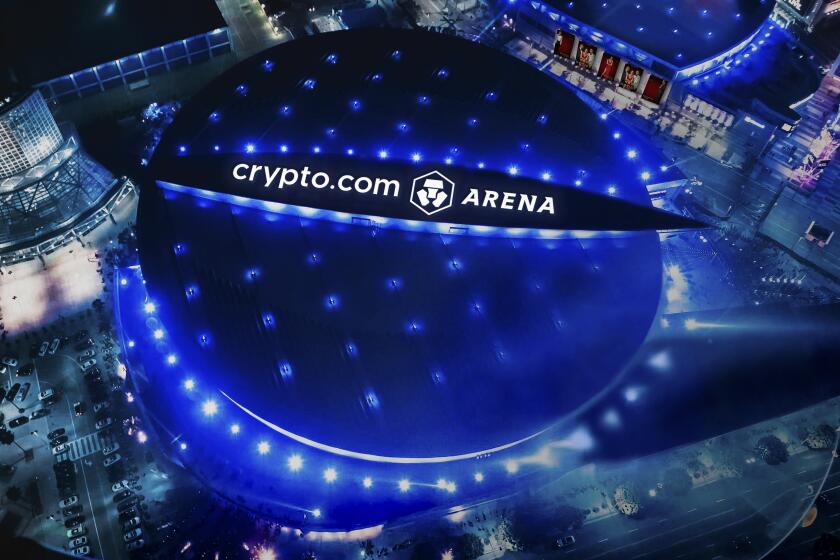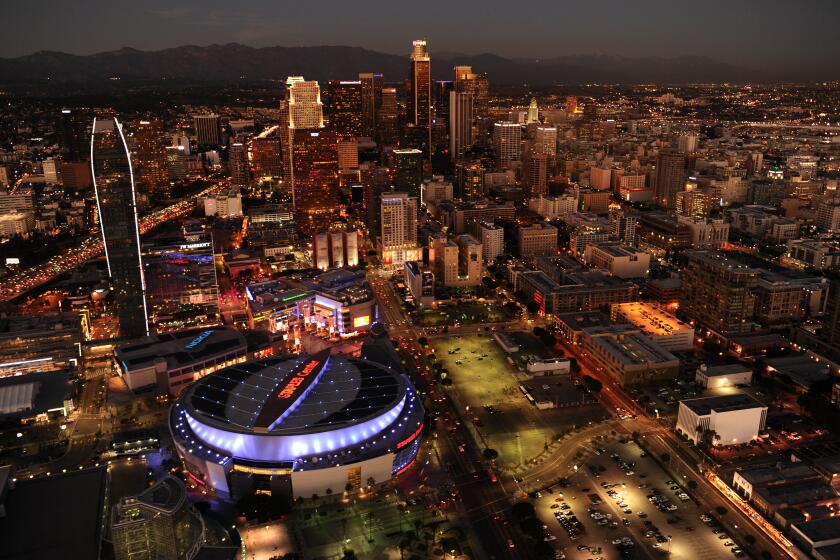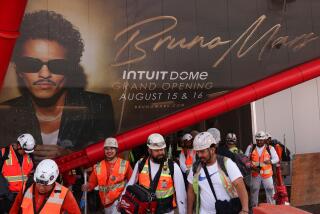Column: It will always be Staples Center, the house Kobe and other stars helped immortalize
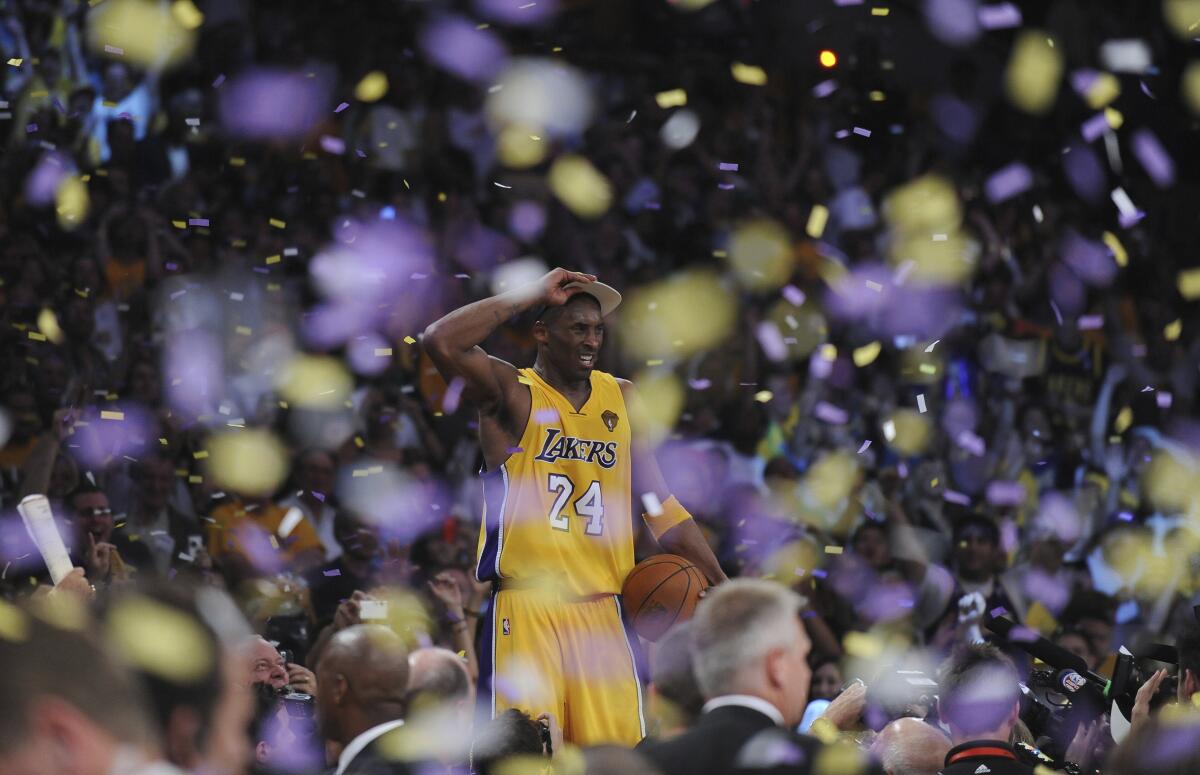
- Share via
It’s an age-old question, famously posed more than 400 years ago by William Shakespeare in “Romeo and Juliet.”
What’s in a name?
The answer in 2021: about $700 million over 20 years for AEG that the owner and operator of Staples Center gained from a stunning naming rights deal announced late Tuesday with Singapore-based cryptocurrency exchange crypto.com.
As of Dec. 25, the red Staples logo will be removed from the arena. By next June all hints of Staples’ sponsorship — which was secured in 1997, two years before the building opened — will vanish. It will officially be called Crypto.com Arena, but few fans are waiting that long to begin launching puns on the new name.
Teams that erase big deficits and win will rise from the Crypt. Teams that flop will be declared dead and will be consigned to the Crypt. Future broadcasts and stories from the building surely will be labeled “Tales From the Crypt.” The possibilities are endless, and a few are truly funny.
The Staples Center will become known as Crypto.com Arena as part of a new 20-year deal between the Singapore cryptocurrency exchange and AEG, owner of the home arena of the Los Angeles Lakers, Clippers, Kings and Sparks.
But Shakespeare had it right. It’s not a name that makes an arena or stadium iconic. Staples is an office supply company. It’s difficult to feel warm and fuzzy about paper clips and legal pads. The name is familiar more than it’s beloved.
What makes the arena memorable is the people you sat with and the events you saw there, sharing high-fives with strangers, leaving with a voice hoarse from cheering and hands sore from clapping. It’s where fans, isolated during the COVID-19 pandemic, can again come together in celebration and feel part of something big and communal.
“A naming rights deal is important and financially it’s significant, but it’s what takes place inside and how well everything is presented, what that experience is each and every time, that’s the most important element,” said Bobby Goldwater, who was hired as Staples Center’s first senior vice president and general manager in 1998 when the site was a construction pit.
“In our industry, and I believe it’s unique in sports and entertainment, people invest their emotions before they invest their money. The events that they attend, the team, the sports, the entertainment, whatever they become attached to and follow, it’s very visible and it’s very personal.”
Staples Center is important not for its name, but because it was the backdrop for Kobe Bryant’s countless ice-in-his veins clutch shots during the Lakers’ championship years. It was, naturally and spontaneously, the place fans were drawn to after Bryant died in a helicopter crash in January of 2020, where they left touching tributes in the streets outside in chalk and marker and tears. It was the right place — the only place — his memorial service could have been held.
Staples Center became embedded in our memories as the showcase for the clever play of Anze Kopitar, the acrobatics of Jonathan Quick and the thumping hits dished out by Dustin Brown as they lifted the Kings’ playoff curse and led the team to Stanley Cup titles in 2012 and 2014. We remember Staples Center for the Clippers’ entertaining, but ultimately championshipless Lob City era, and for the Sparks’ WNBA supremacy.
It became memorable for concerts from the start. Bless Bruce Springsteen’s heart for tweaking the sterile, corporate, fan-distancing suites and skyboxes when he opened the place in 1999. A few months later, fears of an impending Armageddon, stoked by concerns the world’s computers wouldn’t be able to handle the changeover to the year 2000, were at their height when the Eagles played at Staples Center on New Year’s Eve. There was genuine concern chaos would break out in the streets and the world would look terribly different when the show ended and the new millennium dawned.
It turned out to be just another Tequila Sunrise. This old world still looked the same, if a bit hazy in the post-concert glow. Goldwater tried to stage a reunion of the three surviving Beatles but instead assembled a stellar California-themed lineup of Jackson Browne, Linda Ronstadt and the Eagles. “Nobody had a better first season ever than Staples Center had. Nobody,” said Goldwater, who’s an adjunct professor at Georgetown’s sports industry management program and has a consulting business.
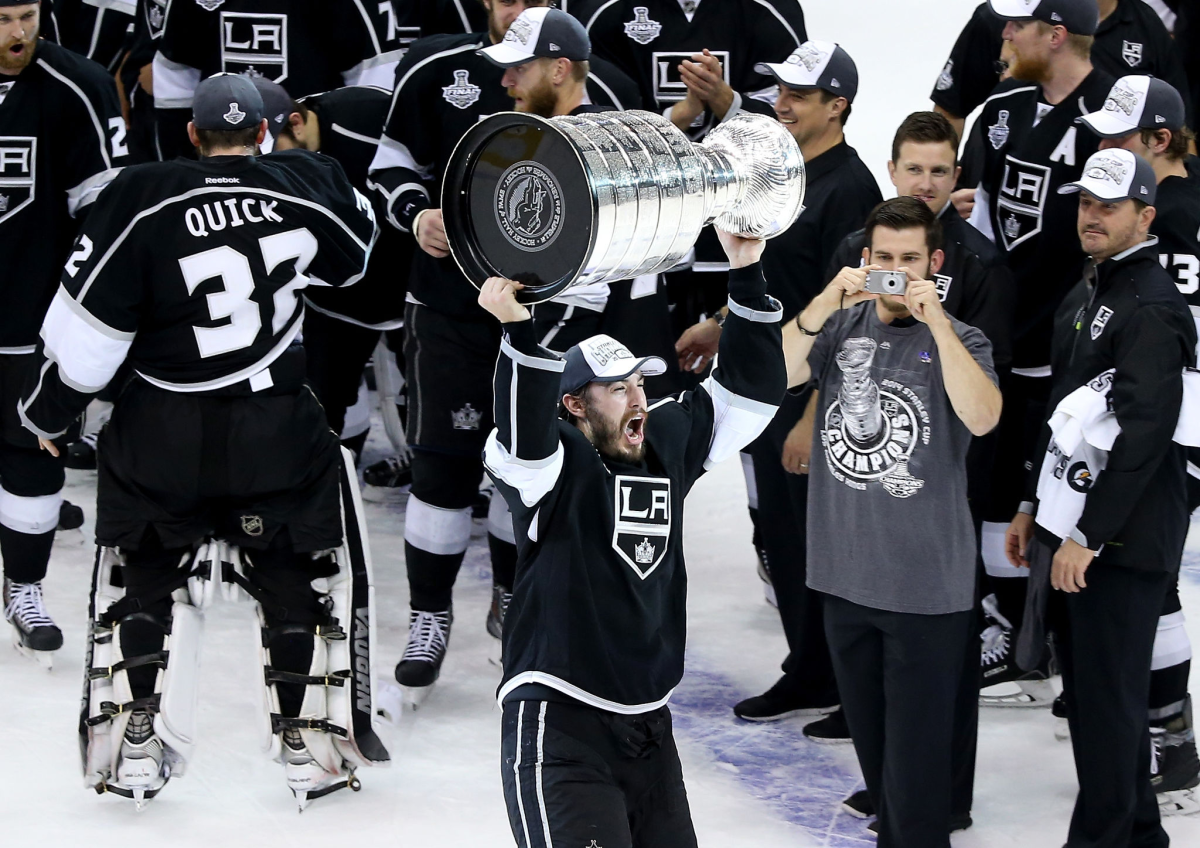
Name changes have become a fact of life in sports, often the result of mergers or terminated deals involving the company that bought the naming rights. What’s now the TD Garden in Boston had a name change before it opened. The Pechanga Arena in San Diego had four previous names. Miami’s Hard Rock Stadium has had a half-dozen names as naming rights sponsors came and left. Anyone remember the O.co Coliseum in Oakland? It’s now Ring Central Coliseum for those keeping score.
Sometimes, changing the name of a familiar place evokes strong emotions. To Chicagoans, the distinctive skyscraper that dominates the skyline will always be the Sears Tower, no matter that it was renamed the Willis Tower in 2009. The place the Mets play will always be Shea to me, even though Shea Stadium no longer exists and the Mets have played at Citi Field since 2009. The Staples Center name likely will linger in conversation long after the signs vanish.
“This just sounds awful,” says one local, wearing a Lakers hat outside of what will soon be called the Crypto.com Arena.
“It’s hard to change people’s habits,” Goldwater said. “It will be interesting to see if people will go with the new name or they decide to maybe stick with the old name.”
Crypto.com Arena looks strange. It’s awkward to say. What won’t change is that the performances within the renamed arena will still stir us and the losses will still trigger regrets. A rose by any other name would smell as sweet. Shakespeare knew what he was talking about all those years ago.
More to Read
Go beyond the scoreboard
Get the latest on L.A.'s teams in the daily Sports Report newsletter.
You may occasionally receive promotional content from the Los Angeles Times.

